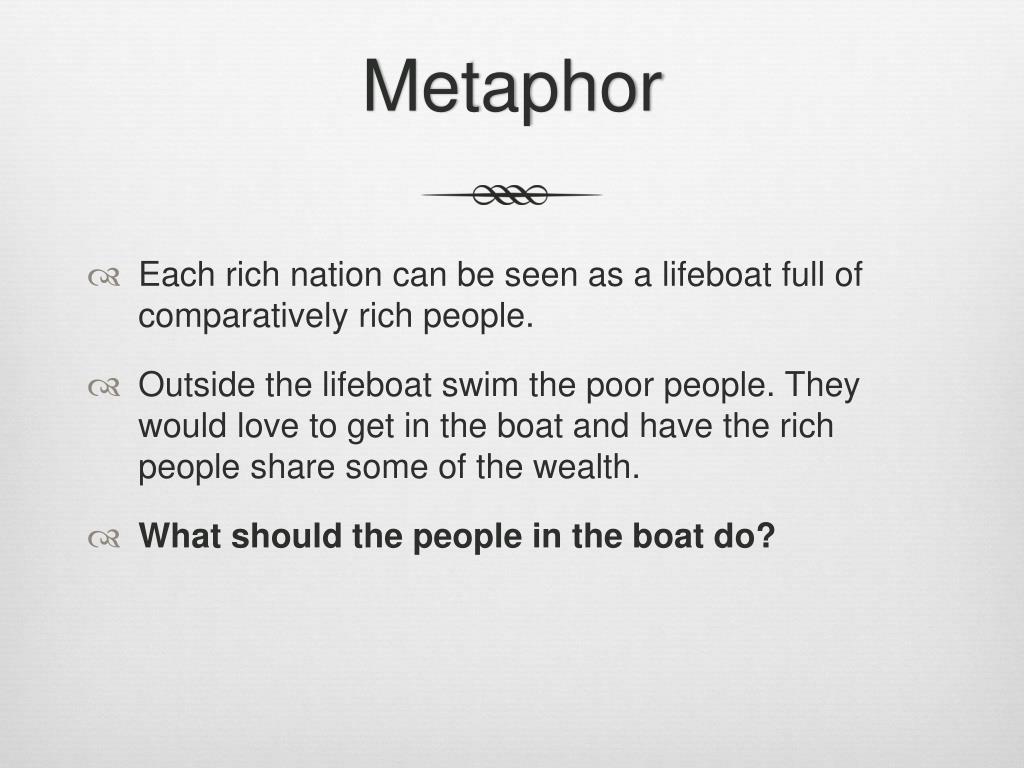
The harsh ethics of the lifeboat become even harsher when we consider the reproductive differences between the rich nations and the poor nations. Let us now enrich the image, step by step, with substantive additions from the real world, a world that must solve real and pressing problems of overpopulation and hunger. This is the basic metaphor within which we must work out our solutions. The net result of conscience-stricken people giving up their unjustly held seats is the elimination of that sort of conscience from the lifeboat. The needy person to whom the guilt-ridden person yields his place will not himself feel guilty about his good luck. My reply is simple: "Get out and yield your place to others." This may solve the problem of the guilt-ridden person's conscience, but it does not change the ethics of the lifeboat. Some say they feel guilty about their good luck.

While this last solution clearly offers the only means of our survival, it is morally abhorrent to many people. Our survival is then possible although we shall have to be constantly on guard against boarding parties. Suppose we decide to preserve our small safety factor and admit no more to the lifeboat. For example, if we don't leave room for excess capacity as a safety factor in our country's agriculture, a new plant disease or a bad change in the weather could have disastrous consequences. But which 10 do we let in? How do we choose? Do we pick the best 10, "first come, first served"? And what do we say to the 90 we exclude? If we do let an extra 10 into our lifeboat, we will have lost our "safety factor," an engineering principle of critical importance. Since the boat has an unused excess capacity of 10 more passengers, we could admit just 10 more to it. We have several options: we may be tempted to try to live by the Christian ideal of being "our brother's keeper," or by the Marxist ideal of "to each according to his needs." Since the needs of all in the water are the same, and since they can all be seen as "our brothers," we could take them all into our boat, making a total of 150 in a boat designed for 60. Suppose the 50 of us in the lifeboat see 100 others swimming in the water outside, begging for admission to our boat or for handouts.

To be generous, let us assume it has room for 10 more, making a total capacity of 60. So here we sit, say 50 people in our lifeboat. For example, a nation's land has a limited capacity to support a population and as the current energy crisis has shown us, in some ways we have already exceeded the carrying capacity of our land. What should the lifeboat passengers do?įirst, we must recognize the limited capacity of any lifeboat.

In the ocean outside each lifeboat swim the poor of the world, who would like to get in, or at least to share some of the wealth.
#Lifeboat ethics full
Metaphorically each rich nation can be seen as a lifeboat full of comparatively rich people. If we divide the world crudely into rich nations and poor nations, two thirds of them are desperately poor, and only one third comparatively rich, with the United States the wealthiest of all. Spaceship Earth certainly has no captain the United Nations is merely a toothless tiger, with little power to enforce any policy upon its bickering members. In their enthusiastic but unrealistic generosity, they confuse the ethics of a spaceship with those of a lifeboat.Ī true spaceship would have to be under the control of a captain, since no ship could possibly survive if its course were determined by committee.

Since we all share life on this planet, they argue, no single person or institution has the right to destroy, waste, or use more than a fair share of its resources.īut does everyone on earth have an equal right to an equal share of its resources? The spaceship metaphor can be dangerous when used by misguided idealists to justify suicidal policies for sharing our resources through uncontrolled immigration and foreign aid. Lifeboat Ethics: the Case Against Helping the Poor by Garrett Hardin, Psychology Today, September 1974Įnvironmentalists use the metaphor of the earth as a "spaceship" in trying to persuade countries, industries and people to stop wasting and polluting our natural resources. Home Society Garrett Hardin Articles Books Videos Quotes Links Tributes


 0 kommentar(er)
0 kommentar(er)
